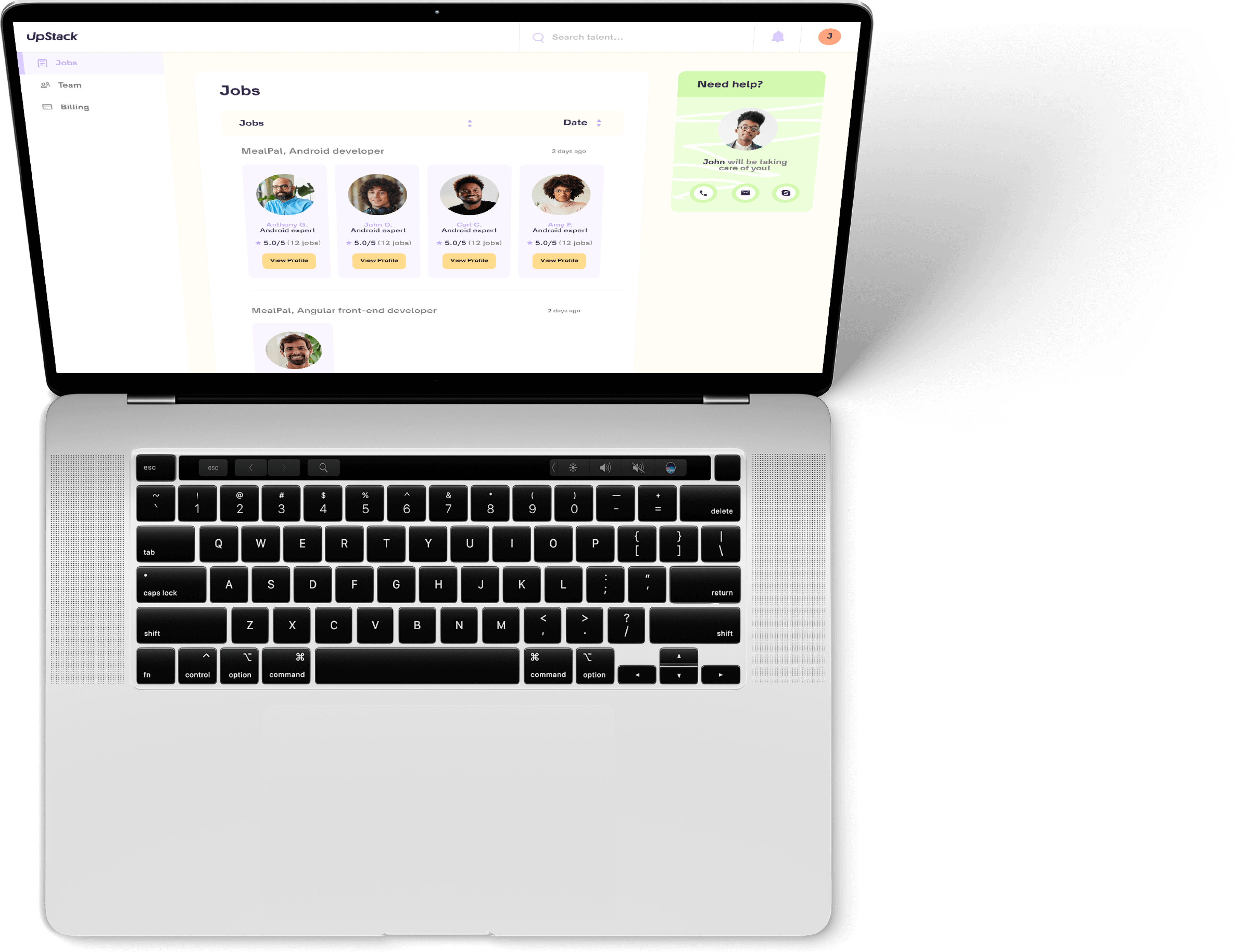


Hire Next.js Developers Remotely {Devs Ready}
Stella B.
Available
Next.js Developer
-
Experienced Next.js engineer with seamless project implementation
-
Loves guacamole & hates spoilers

-
Marcus T.
Available
Next.js Engineer
-
Stacked portfolio of beautiful, functional websites
-
Known for his epic charcuterie & cheese boards

-
David M.
Available
Mobile Developer
-
Mobile engineering guru with a knack for translating stakeholder needs
-
Would rather be diving Palau’s Blue Corner

-
Top UpStack Next.js Developers
Hire Next.js Developers with UpStack
Building a successful and competitive web application can be a daunting task, but a quality Next.js developer is an invaluable asset to help you reach your goals. Finding the right programmer for your project is essential to create a product that meets both your business and technical needs. Knowing what to look for, how to identify the right candidate, and how to ensure they are the right fit for your project will help you hire the right Next.js programmer. With the right developer on board, you can get your project up and running quickly, with a quality product that meets your expectations.
What is Next.js?
Next.js is a framework that allows developers to create serverless, client-side JavaScript applications. It is built on the React.js framework and uses server-side rendering to produce static HTML files that can be easily deployed. Next.js was first released in May 2017 and has since been adopted by a wide variety of companies, from small businesses to Fortune 500 companies. Next.js is a great choice for businesses that want to create a static site or for those looking to create a single-page application. Next.js is a static site generator that is built on top of React. It uses a concept called ‘pages’ to create the content of your website. This is different from the traditional blog setup where content is stored in a database and written in markdown. Pages are more like the old fashioned way of writing a blog, but without the hassle of having to upload files to a remote server for hosting it.
Benefits of using Next.js
- Ease of use - Next.js is incredibly easy to use and understand, making it an excellent choice for businesses of all sizes. With no need to write code in a language like PHP or ASP, programmers can create and implement a website in a fraction of the time. - Rapid development - By providing a framework to create single-page apps, Next.js allows you to create and implement a website quickly. No matter the level of experience of the developer, the time spent building and creating the site is significantly reduced. - Faster time to market - With no need to write code in a language like PHP or ASP, you can create a website quickly. Additionally, you do not need to spend time waiting for a website to be hosted. Instead, you can implement your site quickly, allowing you to release it to the public more quickly. - Reduced cost - Next.js allows you to create a static site that does not require any backend code. This means you do not need to spend money on servers for hosting the site, which can significantly reduce the cost of the project. - SEO friendliness - Static sites are more SEO friendly, making them the preferred choice for many businesses looking to rank on the first page of Google. Static sites are also easier to crawl, making it easier to grab that elusive first-page spot. - No code or design mistakes - With static sites, there is no danger of designers or developers accidentally changing the code or breaking the site. This also means that there is no chance of introducing a bug and having to fix it with a patch or hotfix that can negatively impact the site.
What to look for when hiring a Next.js developer
- Expertise - Next.js is a complex and powerful framework that requires a high level of expertise to create a successful site. Make sure to hire a developer who has a proven track record of success with Next.js, as this will help you get your site up and running quickly and with minimal issues. Expertise does not only pertain to experience with Next.js, but with the overall JavaScript ecosystem and web app architecture as well. - Works well as part of a team - Next.js is a powerful framework, but it should not be used as a crutch to avoid properly researching and understanding the best practices of web app architecture. Make sure to hire someone who understands the importance of working with the rest of your team and who can work together to create a quality product. - Clear communication - Communicating effectively is essential when creating a website, whether it be a simple blog or a complex SaaS application. The ability to communicate within the team and with the client, including designers and product managers, is essential for success.
Ensuring the right fit for your project
- Try a small project - Instead of hiring a developer and bringing them on for the entire project, try them out on a smaller part of it. This allows you to test their abilities, as well as ensures that both sides want to continue working together. - Ask for examples - When meeting with prospective developers, ask them to show examples of their work. By reviewing the code they have written, you can get a sense of their abilities and if they are a good fit for your project. - Find out how they work - Different programmers have different styles and preferences when it comes to creating a website. Find out what type of methodology they use to create your site, as this can help you make sure they are a good fit for your team.
Types of Next.js developers
- Generalist - A generalist developer has a wide-ranging skill set, but might lack the depth necessary to create something truly impressive. When choosing a generalist, try to find one who specializes in one area like front-end development. - Specialist - A specialist programmer has a deep skill set and good knowledge in one area, but may not be as effective in others. When choosing a specialist, try to find one who has experience in your specific project, like a Next.js programmer. - Hybrid - A hybrid developer has a good amount of skill in several areas, but lacks the expertise of a specialist. When hiring a hybrid developer, try to find one who can demonstrate proficiency in your project area of interest, like a Next.js developer.
Questions to ask when interviewing a Next.js programmer
- Why do you want to work with Next.js? - This question can help you understand why they are interested in the project and if they are genuinely interested in the project or if they are just trying to get the job. - What is your architectural philosophy when building a website? - This question can help you understand how the developer thinks about web app architecture and if it aligns with your project. - What is your design process like? - Design, either visual or code, plays an important role in any website, no matter the complexity. Understanding how the developer approaches design can help you better understand how the project will progress. - What do you like most about working with Next.js? - This question can help you understand what the programmer likes most about working with Next.js and if there are any issues with the framework itself.
Tips for hiring a successful Next.js developer
- Ask for recommendations - Friends and colleagues are usually the best people to ask when looking for a programmer. By asking for recommendations from people you trust, you can get a better feel for the developer’s abilities, as well as the quality of their work. - Ask for samples of work - Samples of work can go a long way in helping you understand the quality of the developer’s work and if they are a good fit for the project. - Ask for a working example - Depending on the size and complexity of the project, it can be difficult to find examples of work. Asking the developer to create a small example of their work can help you better understand their abilities.
They trust Our Next.js Developers
Why hire a Next.js developer with Upstack
![Next.js Developer and Programmer Icon]()
Top Next.js talent pre-vetted for a perfect fit.
Our 8-point assessment evaluation ensures that every senior Next.js developer you interview exceeds expectations across technical, cultural, and language criteria.
![Next.js Programmers Computer Icon]()
Hire reliable, passionate Next.js developers.
From late-night sprints to jumping on a last-minute face-to-face, we ensure that your recruits are down to get the job done right.
![Next.js Programmers High Five Icon]()
Risk-free 14-day trial.
Confidently onboard candidates with our no-questions-asked trial period. We’ll walk you through the contract-to-hire process if and when you’re ready to make it permanent with your new Next.js engineer.
![Next.js Computer Programmer Icon]()
Our Client Success Experts provide white-glove service.
Stay laser-focused on your business goals while our team of experts curates potential candidates and manages seamless programmer onboarding.
![Next.js Developer Writing Notes Icon]()
Build your optimal team confidently, quickly.
UpStack handles everything including background and reference checks, legal issues, and more. Our platform streamlines billing, timesheets, and payment all in one easy-to-access place.
Schedule a call with a Client Success Expert to get starting hiring a Next.js developer.
Start hiring Start hiring Start hiring
Hire from the Best.
Working with our Client Success Experts, we’ll help you build the remote team of your dreams with top Next.js talent from around the world.
Pre-vetted, reliable Next.js developers are standing by.





Hiring Next.js Developers | FAQs
How much does it cost to hire a Next.js developer?
UpStack has a simple billing model where each Next.js developer has a standard hourly rate averaging between $65-$75 per hour. Rates are based on skills, knowledge, and experience, and our developers are available mainly for full-time engagement (40 hours per week) and the occasional part-time opportunity (20 hours per week).
What is the process to find a Next.js developer?
You’ll connect with an UpStack Client Success Manager to determine your immediate needs. Our team uses a combination of AI and personal assessment to short-list candidates that match your job requirements. From there, you interview, select, and onboard the perfect developer, all within days of your initial call.
How does UpStack find its Next.js developers?
UpStack’s talent recruitment team connects with software developers around the globe every day. Each Next.js programmer is vetted for technical, communication, and other soft skills necessary for a developer to successfully work with your team. Once vetted, the candidates are accepted into the UpStack developer community.
How is UpStack different from an agency or recruiter?
UpStack's community of available, pre-vetted engineering talent means minimizing roadblocks to scaling your team effectively, efficiently, and immediately. Our Client Success Experts work with you and your UpStack developer to ensure a smooth and seamless engagement.
Can I hire UpStack Next.js developers directly?
Yes, you can hire UpStack Next.js developers at any time, and with the same assurance of smoothly on boarding talent risk-free. First, we’d create a job opening on our portal. Then, we’d vet, interview, and match developers that meet your needs. If you’re satisfied at the end of the 14-day trial period, at any time you can directly hire them.
Common Next.js FAQs
What is Next.js?
Next.js is a popular open-source JavaScript framework that is used to build server-rendered and statically-generated web applications. It is built on top of React, a JavaScript library for building user interfaces, and it provides a set of tools and APIs for building web applications that are optimized for performance, scalability, and developer experience. Next.js is designed to make it easy to build modern web applications that are optimized for search engine optimization (SEO), performance, and security. It allows developers to build server-rendered and statically-generated web applications using the same React components, and it provides features such as automatic code splitting, asset optimization, and server-side rendering. Next.js is a popular choice for building web applications because it is easy to learn and use, and it provides a powerful set of tools and APIs that make it easy to build modern web applications. It is used by companies of all sizes, and it is particularly popular among developers who are building applications that require server-side rendering or static rendering.
How do I logout from Next.js and google auth?
To log out from a Next.js application that uses Google authentication, you can follow these steps:
- Import the Google sign-out function from the google-auth-library package. You can do this by adding the following line to the top of your code file:
Copy codeimport { signOut } from 'google-auth-library';- Call the signOut function to log out the user. This function will clear the user's session and revoke their access token. You can call it like this:
Copy codeawait signOut();
- Redirect the user to the login page or wherever you want them to go after logging out. You can use the Router object from the next/router package to do this. For example:
Copy codeimport { useRouter } from 'next/router'; // ... const router = useRouter(); router.push('/login');Keep in mind that this will only log the user out of the Next.js application. If you want to log the user out of their Google account as well, you can redirect them to the Google logout page:
Copy codewindow.location.href = 'https://accounts.google.com/logout';
This will log the user out of their Google account and redirect them back to the application.
Does next.js use node?
Yes, Next.js is built on top of Node.js, a JavaScript runtime that is used to execute JavaScript code on the server side. Node.js is built on top of the Chrome V8 JavaScript engine and allows developers to write JavaScript code that can be run on the server, outside of a web browser. Next.js is a framework that is built on top of Node.js and is designed to make it easy to build server-rendered and statically-generated web applications using React. It provides a set of tools and APIs for building web applications that are optimized for performance, scalability, and developer experience. Next.js uses Node.js to run the server-side code of a web application and to handle the rendering of pages on the server side. It also uses Node.js to manage the build process and to provide a development server that can be used to test and debug the application. Overall, Next.js is a powerful tool for building web applications that is built on top of Node.js and leverages its capabilities to provide a high-performance and scalable runtime environment.
Is Next.js Frontend or backend?
Next.js is a framework for building web applications that is primarily focused on the front-end, although it does have some capabilities for building server-side applications as well. Next.js is built on top of React, a JavaScript library for building user interfaces, and it is designed to make it easy to build server-rendered and statically-generated web applications. It provides a set of tools and APIs for building web applications that are optimized for performance, scalability, and developer experience, and it is particularly well-suited for building applications that require server-side rendering or static rendering. While Next.js is primarily focused on the front-end, it does provide some capabilities for building server-side applications as well. For example, it allows developers to write server-side code using JavaScript and to handle the rendering of pages on the server side. It also provides a development server that can be used to test and debug the application. Overall, Next.js is a framework that is primarily focused on the front-end, but it does have some capabilities for building server-side applications as well. It is a powerful tool for building web applications that is used by companies of all sizes.
Is Next.js SEO friendly?
Yes, Next.js is designed to be SEO-friendly and is optimized for search engine optimization (SEO). It provides a set of features and tools that make it easy to build web applications that are optimized for SEO, including:
- Server-side rendering: Next.js uses server-side rendering to render pages on the server side, which means that search engines can easily index the content of a Next.js application. This is particularly important for applications that have a lot of dynamic content or that are built using client-side rendering technologies, such as React, which can be more difficult for search engines to index.
- Static rendering: Next.js also provides a static rendering feature that allows you to pre-render pages and assets at build time, which can improve the performance and SEO of your application.
- Automatic code splitting: Next.js uses automatic code splitting to split your application into smaller chunks, which can improve the performance and SEO of your application.
- Asset optimization: Next.js also provides asset optimization features that can help to reduce the size of your application and improve its performance and SEO.
Overall, Next.js is a powerful tool for building SEO-friendly web applications, and it is used by companies of all sizes to build applications that are optimized for search engines.















